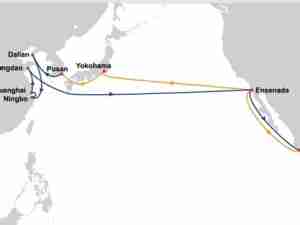China, Long Beach's leading trading partner, was largely shut down the week after the January 29 lunar New Year's Day, causing imports at the Port to edge up only 0.9% to 252,463 teus) in February.
Exports remained strong, jumping 21 percent to 109,963 teus. Long Beach has seen double-digit export increases in 16 of the past 18 months amid strong demand in Asia for US raw materials. With a narrowing of the trade gap, the number of empty containers (almost all headed overseas to be re-filled) declined 2.4% to 153,038 teus.
Green Flags
The Long Beach Board of Harbor Commissioners has awarded its first 'Green Flags,' presenting the full-sized flags to environmentally friendly fleet operators and individual vessels that voluntarily reduced their speeds in 2005 to curb air pollution.
The board approved the Green Flag Incentive Program last fall, offering special recognition and as much as $2.2 million a year in discounted dockage rates beginning in 2007 to vessel operators that have 90% of their ships observe a 12-knot speed limit within 20 miles of the Port in 2006. Reduced ship speeds decrease harmful air emissions in the Port region.
To recognize the many ships that already observe the speed limit, the Harbor Commissioners awarded flags to the Port's 'greenest' vessel operators of 2005.
Voluntary Speed Reduction Program
In 2005, 907 individual ships called at the Port of Long Beach, completing 5,406 sea voyages in and out of San Pedro Bay, and about 65% of all vessel trips complied with the limits of the Voluntary Speed Reduction Program.
The Board awarded the special Green Flags to 333 individual ships and 100 ocean carriers (operating more than one vessel) with 100% compliance in 2005.
The Board also awarded special environmental recognition to six of the Port's largest carriers for operating a fleet that 1) included at least two of these 'Green Flag' ships, 2) sailed 50 or more sea passages in and out of Long Beach, and 3) exceeded a fleet compliance rate of 90%: Orient Overseas Container Line (OOCL), 'K' Line, USS Vessel Management, BP Shipping, SeaRiver Maritime and Hyundai Merchant Marine.
The Harbor Commission also recognized seven other large carriers for operating a fleet that 1) included at least two Green Flag ships, 2) sailed 50 or more voyages here, and 3) exceeded the average compliance rate in 2005.
These carriers were China Ocean Shipping Co. (COSCO), Nippon Yusen Kaisha (NYK), China Shipping Container Line, Mitsui OSK Lines, Matson Navigation, Hanjin Shipping and Alaska Tanker.
Port officials estimate that if all vessels comply with the program, the amount of smog-forming nitrogen oxides (NOx) produced by cargo ships would be reduced by nearly 550 tons a year. At the current two-third compliance rate, the program is reducing NOx by 360 tons a year.
In order for everyone to see who is complying and who isn't in 2006, the Port is posting monthly charts on the Voluntary Speed Reduction Program in the environmental section of its web site at www.polb.com.
PierPASS increasing its truck gate charge
PierPASS Inc. is increasing its truck gate charge to $50 per teu ($100 per feu) for loaded marine containers moving through the ports of Long Beach and Los Angeles during peak daytime hours.
The Traffic Mitigation Fee adjustment, effective April 24, is aimed at better covering the cost of the non-profit's OffPeak program, which provides full truck gates and other terminal services harbor-wide on selected nights and Saturdays.
Terminal operators launched the OffPeak program with an initial $40 per TEU rate. The fee provides an incentive for cargo owners to move shipments at night and on weekends, when there is no fee. The intent is to reduce port-related truck






